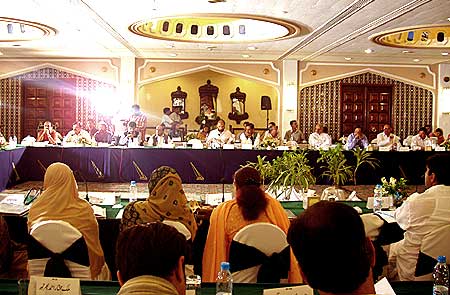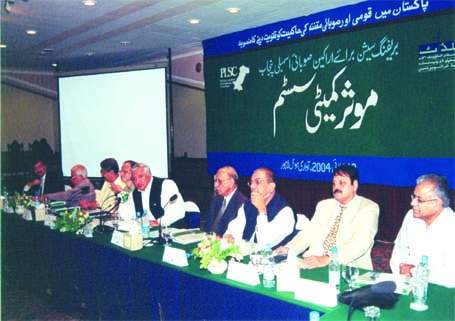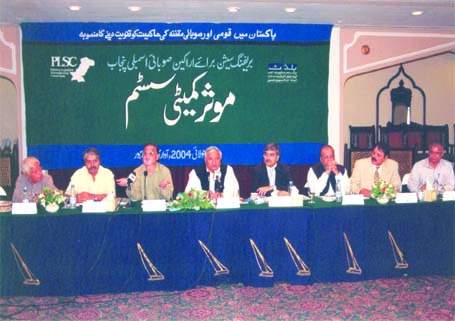| |
A Briefing Session for the members of the Punjab Assembly on the topic of �Effective Committee System� was held by PILDAT on 12th July, 2004. Deputy Speaker Punjab Assembly, Sardar Shaukat Hussain Mazari, while chairing the inaugural session, said that to develop and strengthen parliamentary democracy, government and opposition should work together. He said that a strong democratic parliament could only be possible if it is based on constructive criticism and full participation of its members irrespective of their parliamentary positions. |
|
| |
Senator Chaudhary Anwar Bhinder, Syed Naveed Qamar, Husain Naqi, Mujib-ur-Rehman Shami, Sajjad Naseer and Dr. Syed Abul Hassan Najmee also spoke on the occasion.
|
|
| |
The Briefing session was attended by 42 Members of the Punjab Assembly, 10 members of the legislative staff of the Punjab Assembly as well as by the interns of the parliamentary committees. A Briefing Paper titled as �Committee System of the Provincial Assemblies of Pakistan� was especially developed by PILDAT for this occasion and was distributed among the participants. |
|
| |
The Briefing began with the welcome remarks by Mr. Ahmad Bilal Mehboob, Executive Director PILDAT. Mr. Mehboob said that PILDAT has arranged this briefing session for the MPAs to orient them about the nature of present parliamentary committee system of all the four provincial assemblies of Pakistan as well as to provide them with an analytical comparison of the committee system of Indian state legislatures with that of provincial assemblies of Pakistan. |
|
| |
Mr. Abul Hassan Najmee gave a detailed presentation on the overview of the committee systems of all the four provincial assemblies of Pakistan as well as provided its comparison with the committee system of the Indian state legislatures. |
|
| |
Syed Naveed Qamar said that chairpersons of present committees are given enough resources and powers by their respective Rules of Procedures and Conduct of Business to develop and strengthen the existing committee system. Committees can only strive for more powers if the present rules are being fully utilized. Powers to hold public hearings and summon reports should be exercised by the present committees to hold the government accountable and to secure maximum public participation in governance related issues. Mr. Husain Naqi, national coordinator HRCP, said that the cooperation in the activities of parliamentary committees with civil society organisations is a must in our country because both of these institutions are in transition and therefore are weak. There is a need of cooperation between the parliament and civil society organisations in their function to alleviate social evils and work towards the socio-economic development of the country. Committees which are directly related to human rights issues such as education and human rights should consult and share opinions with relevant non-government organisations. Known journalist Mr. Mujib-ur-Rehman Shami said that a strong parliament depends on its committees for expert opinion and detailed analysis of legislative matters; and true accountability of a parliament can only be achieved if the functioning of the assembly is open to the citizens. Media can play a critical role to bring parliamentary issues to the public and committees can bridge this gap by holding open committee sittings and public hearings on critical social issues. Mr. Sajjad Naseer stressed on the strong working relationship and cooperation between the Universities and Parliaments, while Chuadhary Anwar Bhinder presented recommendations to make the existing committees more efficient and effective. |
|
| |
All speeches were followed by an active Question/Answer session that provided a forum for debate and exchange of ideas between the speakers and the participating audience. |
|
| |
|
|
| |
|
|
| |
|
|
| |

|
|
| |
|
|
| |

|
|
| |
|
|
| |

|
|
| |
|
|
| |

|
|